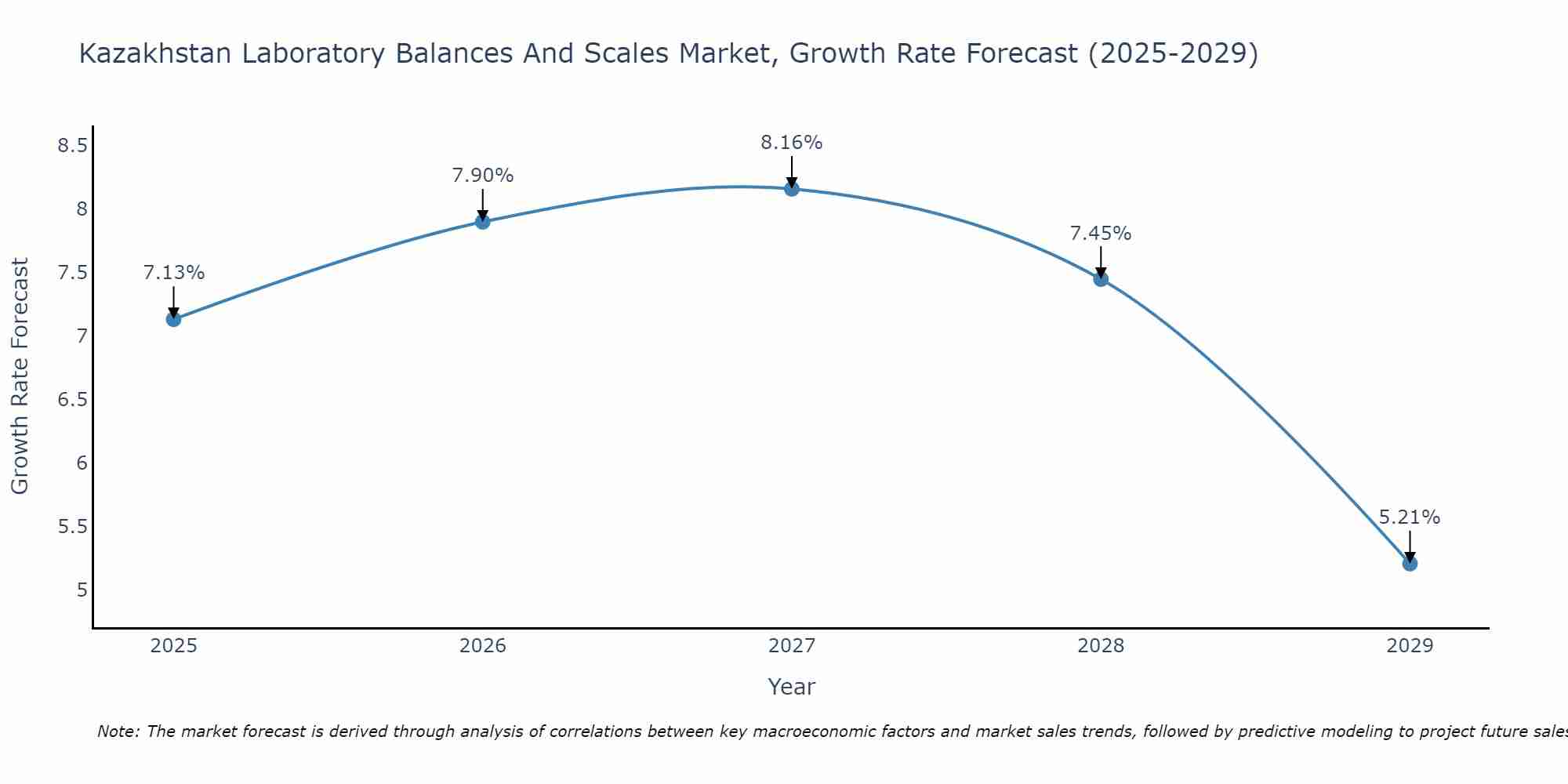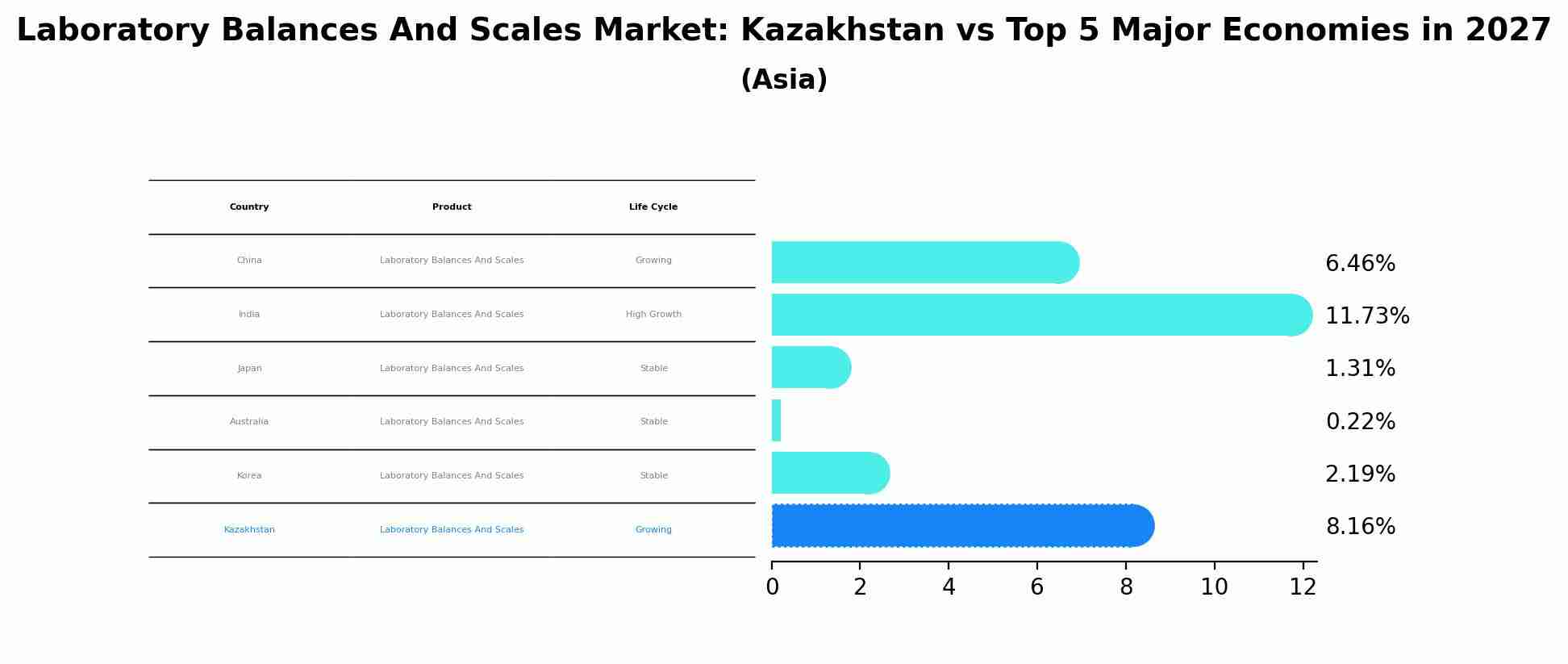Kazakhstan Laboratory Balances And Scales Market Outlook | Growth, COVID-19 IMPACT, Value, Analysis, Trends, Share, Revenue, Industry, Size, Companies & Forecast
| Product Code: ETC365758 | Publication Date: Aug 2022 | Updated Date: Aug 2025 | Product Type: Market Research Report | |
| Publisher: 6Wresearch | Author: Shubham Padhi | No. of Pages: 75 | No. of Figures: 35 | No. of Tables: 20 |
Kazakhstan Laboratory Balances And Scales Market Size Growth Rate
The Kazakhstan Laboratory Balances And Scales Market is projected to witness mixed growth rate patterns during 2025 to 2029. The growth rate begins at 7.13% in 2025, climbs to a high of 8.16% in 2027, and moderates to 5.21% by 2029.

Laboratory Balances And Scales Market: Kazakhstan vs Top 5 Major Economies in 2027 (Asia)
In the Asia region, the Laboratory Balances And Scales market in Kazakhstan is projected to expand at a growing growth rate of 8.16% by 2027. The largest economy is China, followed by India, Japan, Australia and South Korea.

Kazakhstan Laboratory Balances And Scales Market Overview
The Kazakhstan Laboratory Balances and Scales Market are witnessing steady growth driven by the increasing adoption of precision weighing instruments in various laboratory applications. Laboratory balances and scales play a crucial role in ensuring accurate measurements of substances and materials in research, quality control, and testing laboratories across industries such as pharmaceuticals, chemicals, and food and beverage. With the growing emphasis on quality assurance and regulatory compliance, there is a rising demand for advanced laboratory weighing solutions that offer high precision, accuracy, and reliability. Key market players are focusing on product innovation and technological advancements to meet the evolving needs of customers and gain a competitive edge in the market.
Drivers of the market
The Kazakhstan Laboratory Balances and Scales Market is driven by the increasing investments in research and development across various industries, including pharmaceuticals, biotechnology, and chemical research. The need for precise measurement and analysis in these sectors underpins the demand for advanced laboratory balances and scales.
Challenges of the market
A challenge in the laboratory balances and scales market could be the need for calibration and maintenance services to ensure accurate measurements, which may incur additional costs for laboratories. Moreover, competition from international manufacturers offering lower-priced products could impact domestic suppliers.
Government Policy of the market
The government has established regulations to oversee the quality and safety standards of laboratory equipment imported, manufactured, and used within the country. These regulations encompass calibration requirements, maintenance standards, and adherence to international quality certifications.
Key Highlights of the Report:
- Kazakhstan Laboratory Balances And Scales Market Outlook
- Market Size of Kazakhstan Laboratory Balances And Scales Market, 2024
- Forecast of Kazakhstan Laboratory Balances And Scales Market, 2031
- Historical Data and Forecast of Kazakhstan Laboratory Balances And Scales Revenues & Volume for the Period 2018 - 2031
- Kazakhstan Laboratory Balances And Scales Market Trend Evolution
- Kazakhstan Laboratory Balances And Scales Market Drivers and Challenges
- Kazakhstan Laboratory Balances And Scales Price Trends
- Kazakhstan Laboratory Balances And Scales Porter's Five Forces
- Kazakhstan Laboratory Balances And Scales Industry Life Cycle
- Historical Data and Forecast of Kazakhstan Laboratory Balances And Scales Market Revenues & Volume By Type for the Period 2018 - 2031
- Historical Data and Forecast of Kazakhstan Laboratory Balances And Scales Market Revenues & Volume By Laboratory Balances for the Period 2018 - 2031
- Historical Data and Forecast of Kazakhstan Laboratory Balances And Scales Market Revenues & Volume By Laboratory Scales for the Period 2018 - 2031
- Historical Data and Forecast of Kazakhstan Laboratory Balances And Scales Market Revenues & Volume By End-User for the Period 2018 - 2031
- Historical Data and Forecast of Kazakhstan Laboratory Balances And Scales Market Revenues & Volume By Pharmaceutical and Biotechnology Products Testing Laboratories for the Period 2018 - 2031
- Historical Data and Forecast of Kazakhstan Laboratory Balances And Scales Market Revenues & Volume By Cosmeceutical Products Laboratories for the Period 2018 - 2031
- Historical Data and Forecast of Kazakhstan Laboratory Balances And Scales Market Revenues & Volume By Academic Institutes for the Period 2018 - 2031
- Historical Data and Forecast of Kazakhstan Laboratory Balances And Scales Market Revenues & Volume By Research Laboratories for the Period 2018 - 2031
- Kazakhstan Laboratory Balances And Scales Import Export Trade Statistics
- Market Opportunity Assessment By Type
- Market Opportunity Assessment By End-User
- Kazakhstan Laboratory Balances And Scales Top Companies Market Share
- Kazakhstan Laboratory Balances And Scales Competitive Benchmarking By Technical and Operational Parameters
- Kazakhstan Laboratory Balances And Scales Company Profiles
- Kazakhstan Laboratory Balances And Scales Key Strategic Recommendations
Frequently Asked Questions About the Market Study (FAQs):
- Single User License$ 1,995
- Department License$ 2,400
- Site License$ 3,120
- Global License$ 3,795
Search
Related Reports
- Australia IT Asset Disposal Market (2025-2031) | Strategy, Consumer Insights, Analysis, Investment Trends, Opportunities, Growth, Size, Share, Industry, Revenue, Segments, Value, Segmentation, Supply, Forecast, Restraints, Outlook, Competition, Drivers, Trends, Demand, Pricing Analysis, Competitive, Strategic Insights, Companies, Challenges
- UAE Building Thermal Insulation Market Outlook (2025-2031) | Revenue, Companies, Share, Trends, Growth, Size, Forecast, Industry, Analysis & Value
- Portugal Electronic Document Management Market (2025-2031) | Strategy, Consumer Insights, Analysis, Investment Trends, Opportunities, Growth, Size, Share, Industry, Revenue, Segments, Value, Segmentation, Supply, Forecast, Restraints, Outlook, Competition, Drivers, Trends, Demand, Pricing Analysis, Competitive, Strategic Insights, Companies, Challenges
- France Electronic Document Management Market (2025-2031) | Strategy, Consumer Insights, Analysis, Investment Trends, Opportunities, Growth, Size, Share, Industry, Revenue, Segments, Value, Segmentation, Supply, Forecast, Restraints, Outlook, Competition, Drivers, Trends, Demand, Pricing Analysis, Competitive, Strategic Insights, Companies, Challenges
- Portugal Occupational Health & Safety Services Market (2025-2031) | Strategy, Consumer Insights, Analysis, Investment Trends, Opportunities, Growth, Size, Share, Industry, Revenue, Segments, Value, Segmentation, Supply, Forecast, Restraints, Outlook, Competition, Drivers, Trends, Demand, Pricing Analysis, Competitive, Strategic Insights, Companies, Challenges
- Netherlands Occupational Health and Safety Services Market (2025-2031) | Strategy, Consumer Insights, Analysis, Investment Trends, Opportunities, Growth, Size, Share, Industry, Revenue, Segments, Value, Segmentation, Supply, Forecast, Restraints, Outlook, Competition, Drivers, Trends, Demand, Pricing Analysis, Competitive, Strategic Insights, Companies, Challenges
- Belgium and Luxembourg Facility Management Market (2025-2031) | Strategy, Consumer Insights, Analysis, Investment Trends, Opportunities, Growth, Size, Share, Industry, Revenue, Segments, Value, Segmentation, Supply, Forecast, Restraints, Outlook, Competition, Drivers, Trends, Demand, Pricing Analysis, Competitive, Strategic Insights, Companies, Challenges
- Russia Women Intimate Apparel Market (2025-2031) | Strategy, Consumer Insights, Analysis, Investment Trends, Opportunities, Growth, Size, Share, Industry, Revenue, Segments, Value, Segmentation, Supply, Forecast, Restraints, Outlook, Competition, Drivers, Trends, Demand, Pricing Analysis, Competitive, Strategic Insights, Companies, Challenges
- Africa Chocolate Market (2025-2031) | Size, Share, Trends, Growth, Revenue, Analysis, Forecast, industry & Outlook
- Global Hydroxychloroquine And Chloroquine Market (2025-2031) | Industry, Trends, Size, Outlook, Growth, Value, Companies, Revenue, Analysis, Share, Forecast
Industry Events and Analyst Meet
Our Clients
Whitepaper
- Middle East & Africa Commercial Security Market Click here to view more.
- Middle East & Africa Fire Safety Systems & Equipment Market Click here to view more.
- GCC Drone Market Click here to view more.
- Middle East Lighting Fixture Market Click here to view more.
- GCC Physical & Perimeter Security Market Click here to view more.
6WResearch In News
- Doha a strategic location for EV manufacturing hub: IPA Qatar
- Demand for luxury TVs surging in the GCC, says Samsung
- Empowering Growth: The Thriving Journey of Bangladesh’s Cable Industry
- Demand for luxury TVs surging in the GCC, says Samsung
- Video call with a traditional healer? Once unthinkable, it’s now common in South Africa
- Intelligent Buildings To Smooth GCC’s Path To Net Zero













